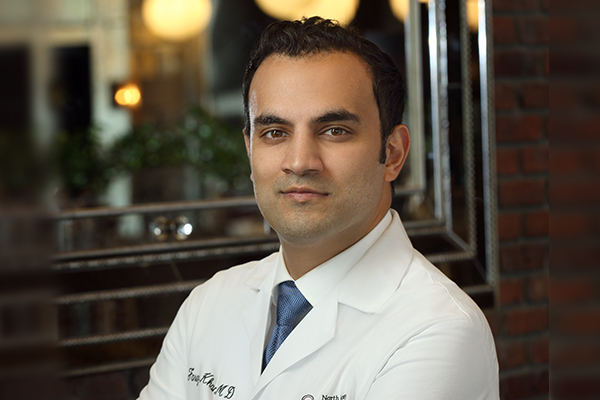Meet Neurosurgeon Mohammed Faraz Khan, MD, F.A.A.N.S Expert in Complex Spinal Disorders


Mohammed Faraz Khan, MD, is a board certified neurosurgeon who has extensive experience in treating complex spinal disorders and conditions such as neck/back pain, sciatica, disc disease, spinal stenosis, spinal fractures, adult scoliosis, spine tumors, and spinal fusions. He is experienced at treating neurosurgical conditions such as brain tumors, hydrocephalus and peripheral nerve disorders, like carpal tunnel syndrome. Additionally, he is an expert in the treatment of traumatic brain and spinal cord injuries, and currently leads a major multi-center spinal cord injury trial to treat and reverse paralysis.
Dr. Khan is known for providing excellent care to patients, but he also stands out for his strong advocacy of conservative treatments with the goal of optimal and safe outcomes by employing minimally invasive techniques. He treats patients as partners in decision making; ensuring that they fully understand all of their nonsurgical and surgical options, and helps them determine the best treatment approach for their unique needs and goals. He advises patients like they are family.
Here are four questions for Dr. Khan, including how he approaches patients and why he is an advocate of minimally invasive techniques.
Dr. Khan: I’m a very conservative surgeon, by nature. When you come to see me, you will be in the driver’s seat. We will review your clinical complaints, your imaging, and your reports. We will consider all the different treatment options and the pros and cons of each, and, together, we will come up with a plan that makes sense for you. If surgery is indicated, I will do my best to incorporate minimally invasive surgical techniques.
Dr. Khan: Minimally invasive surgical techniques entail smaller surgical incisions, less post-operative pain, and I am able to achieve the same outcomes as open surgeries. The tissue destruction and the overall pain and suffering is significantly reduced, as well as the cosmetic deformity from surgery.
Minimally invasive surgery also leads to shorter surgical times, better outcomes, shorter hospital stays, and quicker return to full functionality, in most cases. These factors have been shown to result in well-above average outcomes in my patients. I’m quite proud of those results.
Dr. Khan: In neurosurgery, success can be dramatic. Patients tend to go from being severely disabled, and oftentimes at risk of losing their life, to making an astounding recovery. Being part of that process is extremely rewarding.
One particular case that stands out is a young man who came to the emergency room with acute leg weakness. He was having significant leg pain and was unable to walk. He had a large disc herniation impinging one of his nerve roots, causing his pain and weakness. With a small, minimally invasive laminotomy, I was able to remove the compression from his nerve root. He made a full recovery, with a complete return of his strength.
Dr. Khan: This practice has several key elements that I feel every patient should look for when seeking care for brain and spine conditions. First, the physicians and staff here are kind and compassionate. They’re invested in your good outcome.
Second, the medical and surgical care you will receive here is world class. You will not find better care elsewhere in this area.
Third, our surgeons are all leaders in their field and experts in their respective realm of neurosurgery. The group has the entire gamut of neurosurgery covered from intravascular neurosurgery and neuro-oncology to complex spinal surgery and peripheral nerve surgery. This is a one-stop shop for all brain and spine conditions.
• Fellowship: Complex and minimally invasive spine surgery, University of Miami/Jackson Memorial Hospital Department of Neurological Surgery
• Chief Resident: University of Miami/Jackson Memorial Hospital Department of Neurological Surgery
• Residency: University of Miami/Jackson Memorial Hospital Department of Neurological Surgery
• Medical School: The Jacobs School of Medicine and Biomedical Sciences at the University at Buffalo
• Lead researcher in a multi-center spinal cord injury trial to treat and reverse paralysis